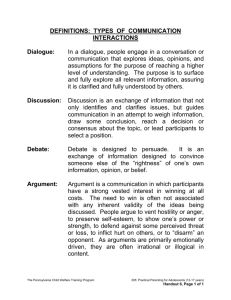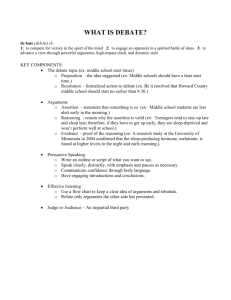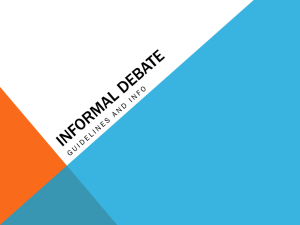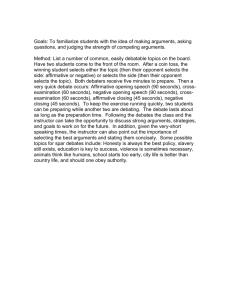Overall, this was a very strong debate. Each side offered
advertisement
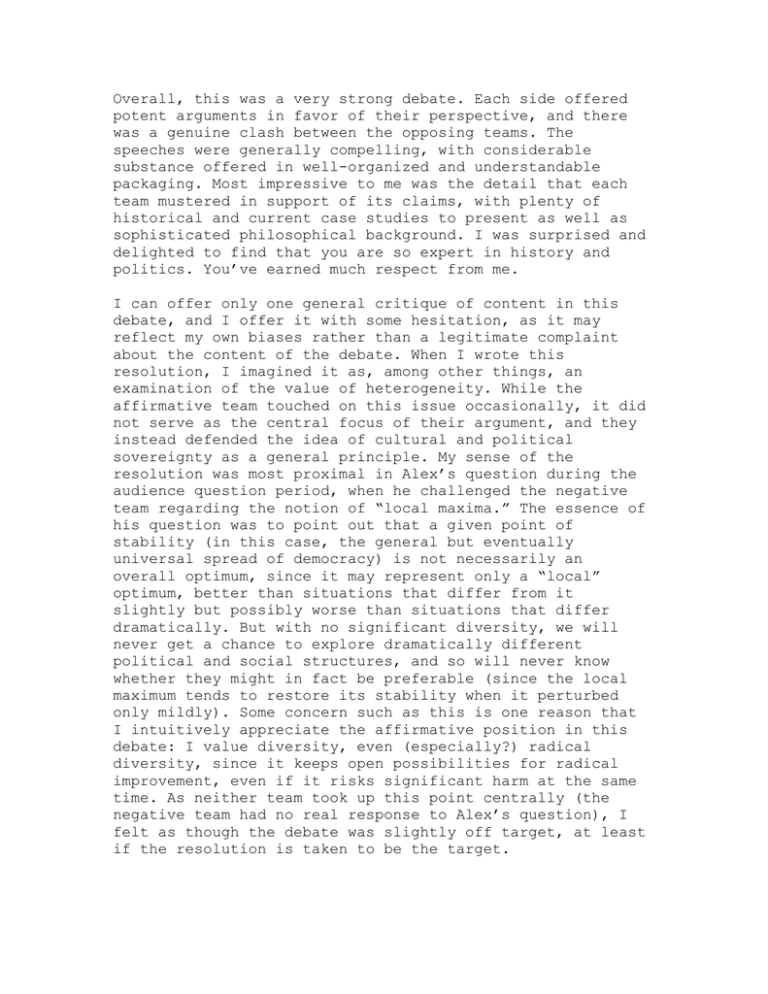
Overall, this was a very strong debate. Each side offered potent arguments in favor of their perspective, and there was a genuine clash between the opposing teams. The speeches were generally compelling, with considerable substance offered in well-organized and understandable packaging. Most impressive to me was the detail that each team mustered in support of its claims, with plenty of historical and current case studies to present as well as sophisticated philosophical background. I was surprised and delighted to find that you are so expert in history and politics. You’ve earned much respect from me. I can offer only one general critique of content in this debate, and I offer it with some hesitation, as it may reflect my own biases rather than a legitimate complaint about the content of the debate. When I wrote this resolution, I imagined it as, among other things, an examination of the value of heterogeneity. While the affirmative team touched on this issue occasionally, it did not serve as the central focus of their argument, and they instead defended the idea of cultural and political sovereignty as a general principle. My sense of the resolution was most proximal in Alex’s question during the audience question period, when he challenged the negative team regarding the notion of “local maxima.” The essence of his question was to point out that a given point of stability (in this case, the general but eventually universal spread of democracy) is not necessarily an overall optimum, since it may represent only a “local” optimum, better than situations that differ from it slightly but possibly worse than situations that differ dramatically. But with no significant diversity, we will never get a chance to explore dramatically different political and social structures, and so will never know whether they might in fact be preferable (since the local maximum tends to restore its stability when it perturbed only mildly). Some concern such as this is one reason that I intuitively appreciate the affirmative position in this debate: I value diversity, even (especially?) radical diversity, since it keeps open possibilities for radical improvement, even if it risks significant harm at the same time. As neither team took up this point centrally (the negative team had no real response to Alex’s question), I felt as though the debate was slightly off target, at least if the resolution is taken to be the target. That is, while I quite liked the grounded and concrete sense given to the terms of the debate, I wondered whether argument about these particular cases (Iraq, Serbia, Somalia, the Cold War, WWII, etc.) necessarily led to conclusions about the resolution as a whole. It is certainly possible, and maybe even likely, that we could find a particular justification for invading Iraq for instance, while still supporting the notion of radical diversity as a general principle (and a general policy, which gets violated in certain circumstances). It is also possible, and maybe even likely, that we could agree that sovereign nations and diverse cultures should be tolerated even at our peril, without believing that it is important to do so in order to preserve or value heterogeneity. That is, the negative team might have argued that the invasion of Iraq was a bad idea but that tolerating heterogeneity has nothing to do with why it was a bad idea. I am suggesting that there was a sort of missing link in the debate between the concrete examples under discussion and their relation to the overall resolution. The debaters seemed to get caught up in the examples, and so miss to some extent the question of their relationship to the resolution. Lastly, in terms of the organization and presentation of the speeches, these were strong showings, with clear and forceful ideas articulately offered. As always, though, there could have been still more “architecture” in these speeches. A couple of the speakers remembered to have an introduction and conclusion to their speeches, but some did not. Furthermore, most of these speeches still came across as a list of ideas or arguments. Instead of just a list, it is very helpful to relate each argument back to the main point, spelling out the details of this relationship to your audience. Moreover, some sort of organizing principle helps not only to clarify your points but to make them more memorable: a list of three categories for your arguments, or a repeated refrain that marks the start of a new argument, or even a consistent and clearly stated numbering system. Listeners need help keeping track of spoken presentations; by telling us your plan and then executing it and then reminding us of what you did, you reinforce and strengthen your points. Still, I was very impressed with this debate overall, and I learned from it. There was much subtlety and there was a willingness on both sides to take the ideas seriously. Great job. Joy, Your opening presentation was wonderfully clear and well paced, with a solid statement of the affirmative position and truly substantive arguments packed into a short space. You seem to have a gift for public speaking, as you naturally organize your words with a certain rhetorical flourish. You don’t show any signs of being flustered or nervous, using a conversational tone and a comfortable pace to get your points across. The only real criticism of this speech that I can offer is the general one: a little more architecture would help. This opening speech was an opportunity to prepare something flashier, and while this was certainly coherent and articulate, it still felt too often like a list of arguments. Was there an overriding approach or theme that could have intervened at key moments in your five minutes? Could you have developed more fully the links between the individual points and the primary claim that founded the affirmative platform? Linda’s cross-examination following this speech was a great way to open the clash between the two teams. Her questions were very aggressive, but she did not sacrifice any substance for the sake of her imposing style. Your answers were well constructed, as they maintained a sense of poise and confidence that they may not have earned. What I mean is that your answers were sometimes evasive or shallow, but your tone never gave away this weakness, and so any observer would have thought that you were matching Linda’s strong questions with equally strong answers. Good job. Your “return” cross-examination was also a strong clash and a good moment in the debate. My sense was that Linda’s resolute attitude eventually felt somewhat unassailable, and you came across as slightly defensive when your roles would dictate that you should be on offense. Still, there was real substance in this examination, and you advanced the terms of the debate. Your closing, rebuttal speech was another highlight, as you rose above the fray with rhetorical questions and a calm, confident presentation. To some extent, you backed off from the most intense clash with the negative team in this speech, instead restating the affirmative position and summing up the key points you felt that the affirmative team had won. To me, this was a good strategy, as the debate had gotten caught up in a lot of details and you were offering some overview, putting it all in perspective for your listeners. A couple of your points had not been covered much since the opening speech, and they felt slightly off track. Nevertheless, you left your audience with a strong sense of reasons to favor your affirmative position. Well done. 3.5 out of 4 Linda, Your opening negative speech offered strong and sophisticated arguments at many levels, making subtle distinctions that could prove decisive in a complex topic like this one. Your aggressive tone never becomes altogether hostile, and listeners are forced to take you and your ideas seriously even if we become slightly uncomfortable being talked at so insistently. Your pace was probably a bit too quick; I know that you had a lot of arguments to work in, but you are probably better off slowing down for maximum clarity and effect rather than making sure to make every possible argument. In fact, some of your points were surely lost on pretty much everyone in the room. Have any of your peers read Rawls’ A Theory of Justice? I know what the veil of ignorance is, but a sophisticated argument like this must be carefully explained if it is to have a broad appeal. You’d be lucky to make this point clear even if you spent fully five minutes on it, so it’s kind of hopeless in thirty seconds. This is too bad, since it is a strong point and worth consideration in a debate on this topic. (Note that Rawls claims that his arguments do not necessarily lead to democracy or capitalism; rather they support a relatively balanced distribution of wealth. If we take his argument seriously, then your claim would lead to the conclusion that the United States should give away most of its assets in an attempt to balance wealth distribution around the world. That would be a tough sell!) As with everyone else, I urge you to try to inject a bit more structure into your speeches. Connecting your individual points to your main point would make everything more clear and more forceful. A few (not most) of your arguments felt like debating tricks rather than sincere and thoughtful points. Though it was discussed at some length, it was never clear to me how your “survival of the fittest” argument was different from a “might makes right” claim, and if it wasn’t different, then this hardly seems like an argument you could offer in good conscience. Your cross examinations were great strengths in this debate. Joy managed to respond to your initial salvo of aggressive questions well, even though her answers were not as substantive as your questions. When she cross-examined you, you actually put her on the defensive by refusing to give any ground. You come across as straightforward and self-confident, which is disarming to your interlocutor. Well done. Your closing speech was quite effective, I thought. Your subpoints were more clearly related to your overall claim, and there was more of a sense of organization of ideas, provided in part by the prior context of the debate. I wish we had had time to discuss your policeman analogy, as I am pretty suspicious about it, but it was a good argument in any case, capturing a complex ethical issue in a familiar context that everyone can immediately understand. 3.4 out of 4 Jiji, Your second affirmative speech laid out a subtle and compelling reason to favor the affirmative team. Your presentation was organized, although this organization was not always clear enough to the audience. For instance, you started off with four points, and while I heard four of them go by, it was not immediately clear where one point ended and the next began. Just saying a number out loud would have helped to distinguish these points and make them memorable. They were also a bit quick. Perhaps giving each one a short name or title would provide a “hook” for listeners to hang your argument on. The bulk of your speech was a second set of three points. These were more clearly distinguished from each other by the repeated phrase, “If we define ‘desirable’ as…,” and this was a really interesting way of constructing an argument. By showing that no matter where you place your value, you must still conclude that heterogeneity is the best way to get there, you offer a seemingly airtight case in favor of the affirmative position. Furthermore, this argument has a built-in structure or architecture, which helps to make it memorable. Probably, you could have used this architecture more effectively though. Had you spelled out your strategy, it all would have come more clearly into focus. By explaining you plan at the outset of the argument and then summarizing it again after the details, the argument would have stuck more and would have carried more force. As it was, it was hard to sort out the real force from the details. Lastly, much of this speech was read off the page, and this limited your ability to make eye contact. The most compelling debate presentations are also the most genuine, so I think you would have been better served to look directly at the audience and speak as if from the heart. Your cross-examinations were very enjoyable. When Asiri questioned you, he kept hammering away at his basic question, and you had consistent responses to this line of questioning. It seemed as though he had trouble developing further questions, which allowed you to stick to your position and made you appear confident and knowledgeable. During your cross-examination of Asiri, the dynamic was very engaging, as each side kept knocking the other onto the defensive. Asiri turned the questioning around by asking you about Tibet, but your response was a stroke of genius when you used the negative’s argument against them. Asiri couldn’t really come back from this attack, though he did successfully shift focus and regain his footing by ignoring Tibet again. His closing moment in these questions was a point for the negative, as he bluntly admitted that his policy does not so much favor the US as it does the strongest system no matter who that might be. Fun question rounds! 3.2 out of 4 Asiri, Your second negative speech hammered home some of the key points in the negative debate. Your pace was excellent and your tone was very clear, with only occasional fading out around the edges of your sentences. It was very wise to begin with a restatement of the negative position overall, and it was too bad that you didn’t end that way as well. In general, this speech was subject to the same criticisms that I offered the others: it would have benefited from a bit more structure. That is, you could have returned even more frequently to your central claim, relating your individual points back to that claim and organizing them using some sort of principle or repeated phrase. But the arguments themselves were well presented and compelling. Your rounds of cross-examination were very entertaining. You started off asking Jiji about a central idea, and you kept coming back to this idea. While she never really gave up much territory, I liked the strategy of reasking the same question, as it forced her to come up with new ways of expressing herself, and might have led to some interesting opening that the negative team could have exploited. When Jiji cross-examined you, there was a great back-and-forth, as each side kept gaining and then losing the advantage. Her response to your question about Tibet was brilliant, but you minimized the damage by quickly shifting focus back to China-US relations, moving away from Tibet. You ended this question period on a really strong note, answering a blunt “Yes,” to Jiji’s question about whether the US should be attacked by a stronger nation. This provocative answer was part of the negative strategy of sticking to principle rather than appealing to nationalistic sentiment, and it’s a strategy that play well, at least when I’m the audience. Nice job. 3 out of 4
